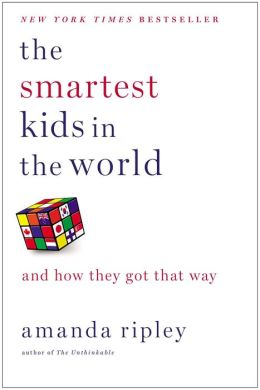 |
| via Amazon |
So I just finished reading The Smartest Kids in the World. The title is a bit of an oversell, but the concept is this: There's an international exam called the PISA, and American kids do terribly on it compared with children from the top three countries: Finland, Korea, and Poland.
I can't remember our exact ranking, but it's somewhere in the twenties. Even affluent American kids fare worse than their counterparts in these countries and whatever you think about testing, the results are still pretty striking. Another interesting point is that upper middle class kids fare about the same on the test whether they go to private or public school, and the countries that have the top rankings spend far less than America does per student.
I know Axel is only 15 months old (until tomorrow!), but I've been thinking about schools a lot lately and even touring a few public and private options. I went to private school from nursery through high school, and I loved my very Harry Potter-esque school experiences. I think my schools served me well and fostered my love of learning. But since I attended school, the cost of private school tuition has seriously outpaced inflation, and in New York can be as much as $40,000 a year. For pre-school.
Of course, there are some slightly more affordable local options in Brooklyn, but I'm a long term planner, and I wanted to know what the real differences were between the private and public schools we'd likely choose, so I've been dutifully checking them out in person.
So far, what I've seen hasn't given me total clarity on the subject. The private schools seemed more play-based, with little wooden kitchens, and teachers who had MAs in English or the fine arts. There was a lot of discussion of projects and multi-disciplinary learning as well as an emphasis on things like music, recess, the arts and field trips. The public schools nearby have been a little more grim, aesthetically speaking, as well as more die hard about following a set curriculum, with 5-year-olds hunched over work sheets and teachers using lots of jargon. From what I can gather, though, they are improving, have involved PTAs, and might be okay for elementary school.
It's hard for me to really parse what I'm seeing or to understand the public schools' grading systems, since I'm not sure how much significance I want to place on testing for kids under the age of, say, ten. And I can't help but wonder if supplementing school with extracurricular activities like music or art would help. Couldn't you sort of cobble together the ideal education with lots of extra help at home?
Of course, these are economic decisions, especially with a second child on the way. I'd love to have faith in our local schools, and in public education as a whole, but this book just prompts more questions!
No comments:
Post a Comment